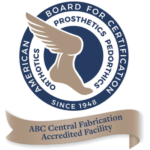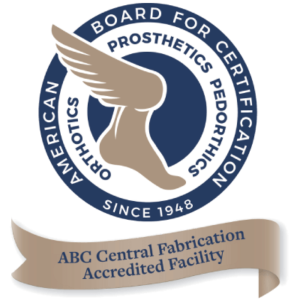What are a few products patients should keep on hand to maintain their prosthetics?
Prosthetics have helped millions of people around the world live normal, fulfilling lives. Custom prosthetics are very durable and resilient, but it’s important to remember that they need to be taken care of so that they can last as long as possible.
Our team has learned a lot over the years about maintaining prosthetics, which can help you keep them in proper working order. Today, we’re going to look at a few items that we’d recommend patients pick up, along with some helpful cleaning tips.
Cleaning Supplies to Buy
Maintaining prosthetics will help them last as long as possible. The most important part of this is to keep the prosthetic device and all of its various parts clean. To start with, here are a few items that we recommend patients always have on hand to clean a prosthetic:
- Mild Soap — This one’s easy because most people will always have mild soap around. All a patient really needs is to keep a bottle of dishwashing liquid at their disposal.
- Prosthetic Cleanser — There are quite a few prosthetic cleansers on the market that are great for cleaning liner materials. These cleansers are typically safe for a patient’s skin, but they should test it on a small area of their skin first to check for sensitivity.
- Liner Care Kit — A great solution for maintaining prosthetics is to pick up the Liner Wand cleaning system. This includes cleanser, applicators, and scrub brushes to provide your liner with a deep clean.
- Body Wash — An alternative to dishwashing liquid that many patients use is their own body wash. Just be sure to avoid any that include beads or scrubs because that could damage the liner.
Cleaning Your Gel Liner
Since the gel liner is always in contact with the patient’s limb, it needs to be cleaned every day. First, remove it from the prosthetic. If the outside is dirty, wash it with antibacterial soap mixed with warm water. Then, turn it inside out and wash the gel section.
Next, rinse it off, dry it with a clean cloth, and turn it right side out again.
Cleaning Socks or Sheaths
It’s very important to wear prosthetic socks or sheaths every day. Patients must put on a fresh one when they get up in the morning or whenever they start their day.
These items can have slightly different cleaning instructions, so the instructions on the label must be followed. Also, a prosthetic sock should be changed if the patient has been active and it’s soaked with perspiration. Not following these guidelines could risk their health.
Cleaning the Prosthetic Socket
Some patients will avoid cleaning their prosthetic socket because it doesn’t come in contact with the skin, so they don’t think it’s needed. On the contrary, cleaning it will help the socket stay durable and operate properly. All the patient needs to do is clean it once per week with soap and water. Then, lightly spray it with an alcohol-based cleaner and wipe it dry.
Other Prosthetic Care Tips
Maintaining prosthetics isn’t very difficult as long as you have the right cleaning supplies and understand how to use them.
Here are a few other prosthetic care tips that patients should follow:
Check it on a daily basis
It seems that everyone has a hectic schedule these days, and we’re guessing that this includes most of your patients. You need to impress upon them, though, the importance of a daily cleaning and maintenance routine for their prosthetics. If they can stick to a daily ritual, they’ll find that maintaining their prosthetic will become a tiny part of their day.
Don’t Go Swimming with It
Most prosthetics can be damaged if submerged in water. If a patient decides to take a dip, he or she will need to remove the prosthesis first. Of course, another option is to have a prosthesis fitted to the patient that’s specially made for swimming, scuba diving, and other waterborne activities.
Check for Any Loose Parts
Prosthetics are built to last for a very long time. Of course, since they typically get daily usage, certain parts may loosen. Every once in awhile, a patient should check the screws and bolts in their prosthesis to see if they need to be tightened, adjusted, or replaced. This will help ensure a comfortable fit in addition to long-lasting durability.
Listen for Unusual Noises
A big sign that a prosthetic isn’t functioning properly is some type of unusual noise. This could be anything from clicking or grinding to popping or squeaking. Any type of unusual noise should never be ignored. The patient will definitely want to go see his or her doctor right away.
Report Problems Immediately
Speaking of going to the doctor right away, if there are any issues that can’t be easily rectified, the patient will want to get them checked out immediately. Although prosthetics are very durable, they should be examined by a doctor on a somewhat routine basis or if they notice anything wrong. This will help prevent severe problems from occurring.
Contact Grace Prosthetic Fabrication for Assistance with Prosthetic Maintenance
Grace Prosthetic Fabrication works closely with doctors to deliver well-fitted, customized prosthetics for their patients. If you have any questions about maintaining prosthetics or would like to know more about any of our products, give us a call at (800) 940-5347 today.






